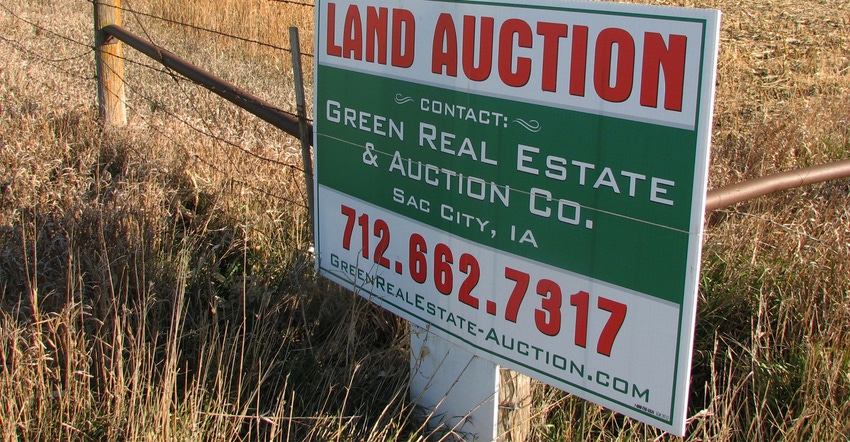
New websites are popping up to provide information about farmland values based on results of recent sales, soil productivity, soil maps and other data. Three of these sites looking at Iowa farmland are: What’s My Farm Worth? by Peoples Co.; Acre Value, by a California-based firm; and Terva, a startup created by an Iowa State University student. All three sites aim to make it easier for farmers and others to gain insight on land values.
Iowa farmland values have risen significantly over the past decade, posting the strongest increases as corn and soybean prices peaked. Land values reached a record high in 2013 with a statewide average of $8,716 per acre, according to ISU’s annual survey. Last year land values fell for the third year in a row, the first time that has happened since the 1980s farm crisis. In 2016 land values averaged $7,183 per acre.
The Terva website was started by Steven Brockshus, an ISU senior. He was inspired after visiting Japan where he learned that a million acres lie fallow, not used to grow food, because landowners weren’t able to make connections with farmers or potential land buyers. Brockshus came back to Iowa and attended a land sale with his father, a northwest Iowa farmer, and thought about land values some more. He also took an ag entrepreneurship class at ISU, which helped him realize that his Terva idea had possibilities.
Farmland information online
Brockshus got on the internet and couldn’t find much data available on farmland sales. He found companies with websites such as Zillow, Trulia and others providing urban homeowners and buyers with residential values. But it wasn’t easy to find much out about farmland. “That was a big surprise for me,” he says.
He is now combining public data, including land auctions and sales, with mapping software. He describes it as “a marriage of Google maps and public records.” The 23-year-old Brockshus, who graduates in May, says Terva is targeting its first efforts in Iowa. He expects to launch a fully developed site for Iowa soon, and add other Midwest states before going nationwide.
Unlike other sites, Terva isn’t estimating a land value but is giving farmers, investors and landowners the data they need to determine their own value. “We want to create an online marketplace, so farmers can get a fair value when they sell or rent their land,” says Brockshus. Terva is now free, but will eventually charge a fee based on how many services users need.
What’s My Farm Worth?
Steve Breure, president of Peoples Co., a Des Moines-based farmland broker, wanted to see how his company could use technology to better help Iowa farmers value their land. A year ago, Peoples launched What’s My Farm Worth? a website building on profitability data developed by partner AgSolver, an Ames-based firm. AgSolver offers services to help farmers use detailed data to determine their most and least profitable acres to make better farm management decisions.
What’s My Farm Worth? is a free service that calculates farmland value based on a five-year corn price, average yield by county and soil type, rental value, and other factors. Bruere sees such sites as a tool that can help brokers and appraisers connect better with farmers, landowners and investors. “It’s both exciting and a little intimidating,” he notes. “In some ways we’re allowing technology to replace some of the functions our industry provides.”
Bruere is talking to Terva and to AcreValue’s general manager Tamar Tashjian about possibly using their sites as well. Tashjian, speaking at the recent 2017 Iowa Land Expo in Des Moines, said the idea for AcreValue came when co-founder Chris Seifert’s family began discussing the value of their farm in Pocahontas County. The family was debating whether to sell the land or hold onto it. Seifert, a scientist at Stanford University, decided he was going to help his family make this decision based on data.
Lack of sales is hindering
Unable to find much information online about farmland, Seifert developed an automated valuation program. This type of computer software program has existed in commercial and residential real estate for probably 10 years now, says Tashjian. Acre Value includes details about the farm property such as soil maps and expected productivity of crops grown on fields. The AcreValue service is free but premium options will soon be added.
Complicating the valuation of farmland is lack of turnover in ownership. In the residential real estate market, it’s estimated that 5% to 6% of homes are bought and sold each year. In the farm real estate market, it’s about 1%, as families hold onto farmland for decades. In some areas you may not have enough land sales to estimate the value. Tashjian says her company gets public data. “We’re able to supplement that with survey data to help improve the model. But it’s a challenge when land is thinly traded,” she notes.
While farmland values can be used for sales, they can also be helpful in negotiating farmland rental rates. However, in estimating land values, keep in mind computer program models aren’t perfect. Some things that go into the equations are hard to pin down. AcreValue plans to evaluate the accuracy of its analytic model after it becomes better established.
“In determining land values, there are factors that are impossible to predict,” notes Tashjian. “For example, if a farm is auctioned, who are the people at the auction? They will determine demand. Is there a neighbor bidding on the land or an outside investor? Or is it a situation where the landowner is being forced to sell the land for some reason? It’s hard to measure those drivers. You can’t measure the emotional factors.”
For more information, visit AcreValue at acrevalue.com, What’s My Farm Worth? at peoplescompany.com/whats-my-farm-worth and Terva at terva.ag.
About the Author(s)
You May Also Like




